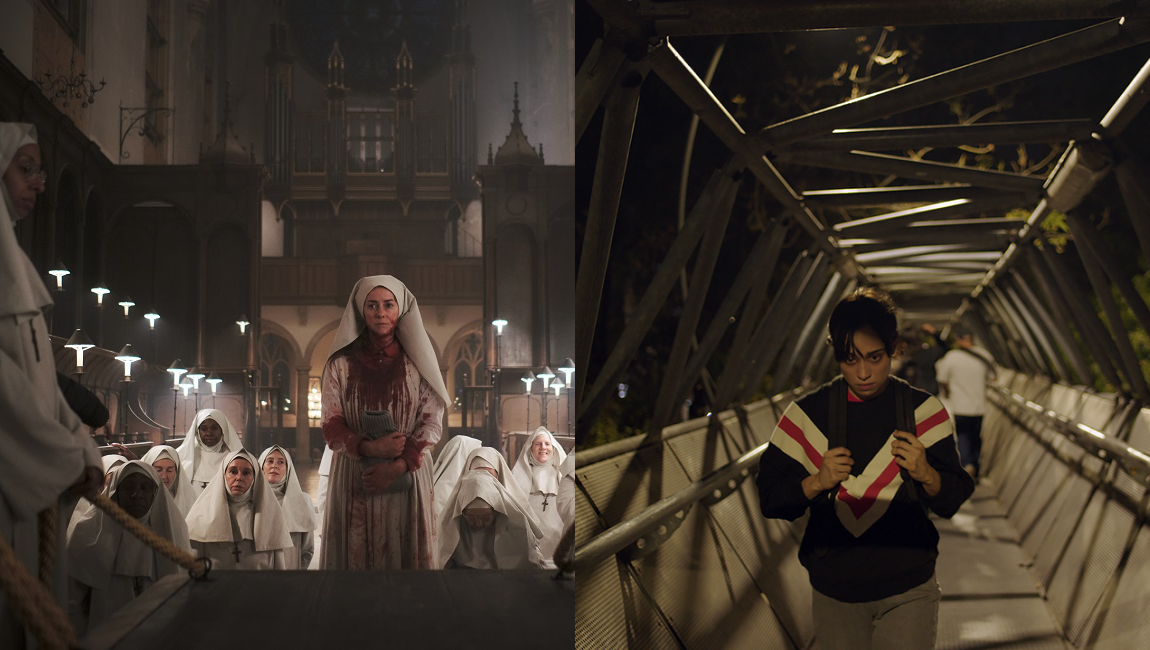Two new horror films arrive on screens this week which, paired together, suggest a kind of state-of-the-genre address: Christopher Smith’s Consecration offers a lovingly constructed model of the classical sort, a mixture of heavy religious symbolism and gothic portent shot through with all the trappings of a haunted house tale; on the other hand, Michelle Garza Cervera’s Huesera represents the more modern strain of horror-as-metaphor. The good news is that both are quite sturdy, while also still butting up against some of the limitations of their respective modes.
Continuing Smith’s dedication to strong (if troubled) female leads, a la Creep, Severance, Triangle, and the more recent The Banishing, Consecration follows Grace (Jena Malone) as she investigates the mysterious death of her brother, who has supposedly murdered a priest and then committed suicide. But Grace, a doctor and dedicated atheist, knows all too well how devout her brother was — he was also a priest — and cannot believe that he would either murder someone or commit the cardinal sin of suicide. And so Grace travels to the scene of the crime: an ominous church in the remote Scottish countryside built into the cliffs of a fierce, roiling sea. Here she encounters a standoffish Mother Superior (Janet Suzman), who seems to have her own motivations for keeping secrets, as well as an emissary from the Vatican, Father Romero (Danny Huston), who may or may not be there to help Grace uncover the truth.
But while the film begins with a nun threatening Grace with a large handgun (thereby positioning the rest of the movie as a prolonged flashback), this isn’t a religious hysteria film in the vein of The Devils. Instead, Smith weaves a tangled web of visions and premonitions that obscures the truth of the matter for much of the film’s runtime, creating a puzzle box narrative that’s as much a mystery thriller as horror-shocker. Mother Superior believes that Grace’s brother was possessed by a demon, while Grace and Father Romero can’t bring themselves to admit that such a thing might be possible. Eventually, Mother Superior reveals that Grace herself is the key to everything, triggering a series of hazy memories as Grace recalls her troubled childhood and own murderous father.
It’s a very busy plot, and if it occasionally gets too tangled for its own good, Smith has such a keen eye for precise compositions and deftly timed jump scares that audiences might not mind the lumpy parts. Smith’s own Black Death, which chronicled crusaders hunting down witches in the name of God, already suggested a director with a deeply rooted antipathy toward organized religion, while The Banishing only strengthened such a reading. In his eyes, the strict rules and binding gender roles of the Church are smothering and restrictive, not something to be celebrated but something to struggle against and overcome. But Smith knows the genre well, too, making sure to indulge in bloody mayhem and spooky, blink-and-you’ll-miss-them specters that haunt the edges of the frame. Other favored motifs also pop up — particularly Smith’s love of mirrors that bisect or otherwise section off parts of the frame to suggest an active off-screen space. It amounts to a masterclass in build-up, even if the payoff isn’t especially exciting (audiences are sure to uncover the bad guy here long before Grace does).
Huesera, on the other hand, feels very “of the moment.” It’s a jittery, nervous film, also focused on a strong female protagonist but to very different ends than Smith’s film. Introduced while trying desperately to conceive a child with husband Raul (Alfonso Dosal), Valeria (Natalia Solian) soon finds herself pregnant. The couple is elated, and so begin the many preparations necessary for the baby’s arrival. It’s a detailed portrait of blissful domesticity, that is, until Valeria begins seeing strange things. A faceless figure peers out at her from the shadows, and then a neighbor jumps from a second-story window, shattering both legs in the process. Valeria is horrified, but every time she alerts Raul to some strange phenomenon, he sees nothing. Is it a demon, or is it all in Valeria’s head?
The film is, of course, a metaphor for motherhood, the changes to Valeria’s body manifesting themselves as a demonic presence onscreen. If this is the realm of the dreaded “elevated horror” slur, Cervera at least has the good sense to deliver the horror goods alongside her trauma narrative. Solian is remarkable in the lead role, effortlessly portraying Valeria’s gradual transformation from happy mother-to-be to something altogether more conflicted. She’s a woman with no maternal instinct, no matter how hard she tries to force it. Her mother and sister poke fun at her more masculine tendencies, and Cervera ultimately reveals Valeria’s past history as a hardcore punk rocker and lesbian. And so, it’s clear that Valeria married a man and embraced domesticity in a concerted effort to leave her past behind her, and much of Huesera’s narrative involves that past catching up with her.
To this end, Cervera pulls off two genuinely unnerving set pieces, one involving Valeria’s attempt to babysit her niece and nephew, which goes horribly awry, and another which finds a very pregnant Valeria getting into a mosh pit at a rock club. The sound design does a lot of heavy lifting here, as the entire movie is replete with the snap-crackle-pop of joints and splintering bones. As Valeria’s mother is quick to point out, “Motherhood changes you,” and it’s in more ways than one, of course — life is pain, and change is painful, too. As opposed to Smith’s relative classicism, Cervera favors jagged editing and a proliferation of handheld close-ups, conjuring an oppressive visual scheme that puts viewers firmly in Valeria’s foggy headspace. It’s mostly impressive stuff, but the abrupt, opaque ending is truly astounding, sure to be interpreted as happy or depressing depending on the individual. Solian is an outright star in the making, and Cervera is an intriguing new talent. It’s a good week to be a horror fan.
Published as part of InRO Weekly — Volume 1, Issue 6.







